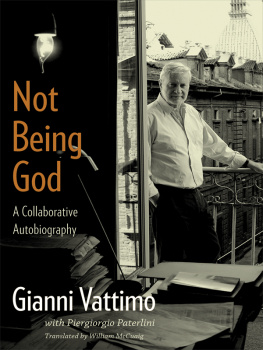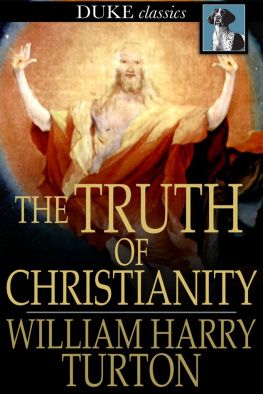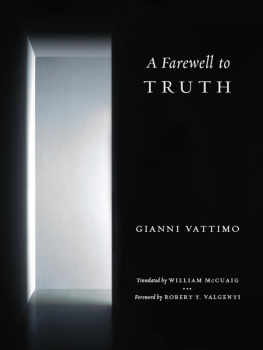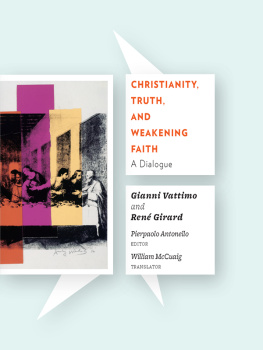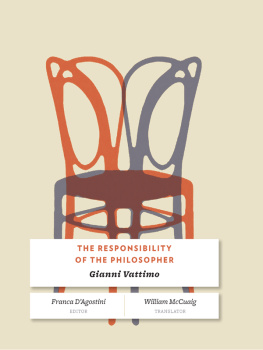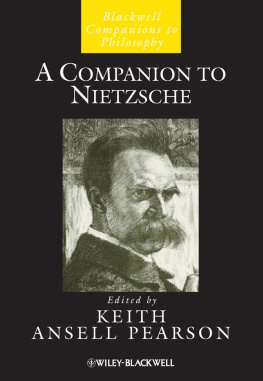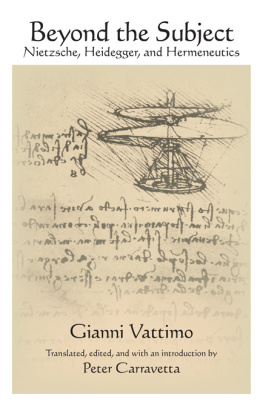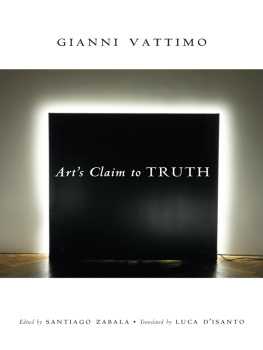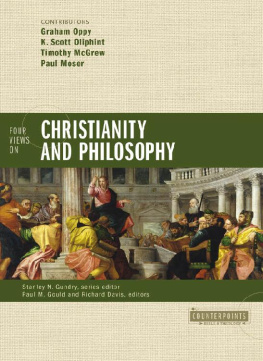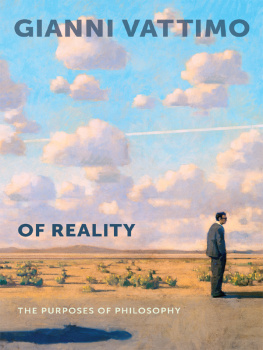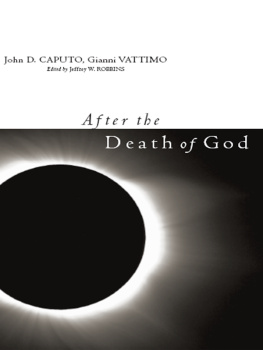NOT BEING GOD
NOT BEING GOD
A Collaborative Autobiography
GIANNI VATTIMOwithPIERGIORGIO PATERLINI
Translated byWILLIAM MCCUAIG
COLUMBIA UNIVERSITY PRESS NEW YORK

COLUMBIA UNIVERSITY PRESS
Publishers Since 1893
New York Chichester, West Sussex
cup.columbia.edu
COPYRIGHT 2009 COLUMBIA UNIVERSITY PRESS
PAPERBACK EDITION, 2010
ORIGINALLY COPYRIGHT 2008 ALIBERTI EDITORE S.R.L.
All rights reserved
E-ISBN 978-0-231-51957-1
Library of Congress Cataloging-in-Publication Data
Vattimo, Gianni, 1936
[non essere Dio. English]
Not being God : a collaborative autobiography / Gianni Vattimo with Piergiorgio Paterlini ; translated by William McCuaig.
p. cm.
ISBN 978-0-231-14720-0 (cloth : alk. paper)ISBN 978-0-231-14721-7 (pbk. : alk. paper)ISBN 978-0-231-51957-1 (e-book)
1. Vattimo, Gianni, 19362. PhilosophersItalyBiography. I. Paterlini, Piergiorgio, 1954II. Title.
B3654.V384A3 2009
195dc22
[B]
2008045981
A Columbia University Press E-book.
CUP would be pleased to hear about your reading experience with this e-book at .
DESIGN BY: MARTIN N. HINZE
Dear Professor, in the end I would much rather be a Basel professor than God; but I have not dared push my private egoism so far as to desist for its sake from the creation of the world.
FRIEDRICH NIETZSCHE, LETTER TO JACOB BURCKHARDT
FROM TURIN, JANUARY 6, 1889
Gianni Vattimo is the philosopher who has fought all his life against the confines of object-ivity and the absolutes that imprison us. This bookwhich tries to recount, in a comprehensible manner, the life and thought of Gianni Vattimo, who turned seventy in 2006, when it was writtencannot, therefore, advance claims to object-ivity, to absolute truth. Besides, it is a strange book. We both know it, Vattimo and I. We made the choice. It is not an autobiography in the usual sense, because I wrote it, and its not a biography because Vattimo is cosigning it and speaks in the first person.
So how did we arrive at this fused impasto of two voices, two persons? Ultimately, because I wanted to do it (long live subjectivity) and because Gianni Vattimo agreed to do it with me. But above all, because this necessary (auto)biography is something hewho writes so engagingly, unlike many of his colleagueswould never have written. The idea would never have occurred to him, and he would not have written it anyway. So this note already forms part of the (auto)biography. It states fact number one about Gianni Vattimo: Gianni Vattimo is someone who would never have written his own autobiography for himself.
Over his long philosophical trajectory, which began and is constantly interpenetrated with the theme of Being, Gianni Vattimo has come to the view that Being eventuates for us in language, or rather in human conversation, in colloquy.
This (auto)biography comes about exactly so: in human colloquy between the great philosopher and me.
Lately Vattimo has been defending, and accepts as positive and fertile, a certain indeterminacy in history and in the writing of books. Resonances, even, and perhaps something more. Because anyone telling his own story selects, consciously and unconsciously; to use a favorite expression of Gianni Vattimo, he goes and finds out (va a sapere). And this selection is obviously overlaid with my own. With a certain claim to honesty and objectivity, if not object-ivity, in an attitude of listening, something especially dear as well to Vattimo the man and Vattimo the thinker.
The one thing that cant be said about this book is that its structure does not respect, indeed virtually replicatein a way quite unexpected and surprising, even for methe existential, human, and philosophical trajectory of the person doing the telling.
Piergiorgio Paterlini
My dear Stefano,
Does growing older ease the pain of living? Does it make us less capable of suffering, and so of loving and experiencing passion? Does it make us more cynical, harder, less sensitive? I ask myself this today, at the onset of my old age.
I fear that the answer is yes, and I reproach myself for it.
On my seventieth birthday I spent the dayyou werent there, as usual, I note with a touch of bitterness, but with much greater tenderness for you, as you know, and acceptance of your being so young and beautifulI was saying, on my seventieth birthday I spent the day with a few friends in the little house I have at Roquebrune, drinking terrible wine and sending e-mails saying, Today I bid a sad farewell to sixty-nine.
Then I took a fall. Like a moron. Like a baby. Stumbled, slipped, I dont know. What I do know is that I banged my head hard and got a huge bump. I keep asking myself: Is this the first sign of dementia? Have I got a brain tumor? Is this kind of thing normal at my age?
I know well enough that people will adapt to anything sooner or later to keep on living. But though this is immensely reassuring, it does make it seem as though things, even the most important things, thereby lose value. Its, how shall I put it, a little... disappointing.
When Sergio, who had lived with Gianpiero and me for close to fifteen years, and then alone with me for another eleven, died, the pain I felt was less acute than when Gianpiero died. And for that I do blame myself. I really have the impression that I felt less pain, that I suffered less, with less intensity.
Then again, if somebody had told me beforehand what I was going to go through during the devastating illness and prolonged agony of Gianpiero, all the thousand little everyday things, I wouldnt have been able to stand the thought. Yet here I am. So its really true, then, you can get through anything, adapt to anything? Its this that makes me suspect that maybe everything loses a bit of value, a bit of intensity with the passing of time. If you dont actually die from love, perhaps it wasnt such a great love after all, or maybe it was. So there it is, a question to which I havent yet found the answer.
Today, if someone brings me sad news, even very sad news, like the sudden discovery that they have a tumor, as someone did recently, my first reaction is: Ive already been through worse. Then of course I do still suffer for the things one has to suffer for, and yet....
When it comes to public affairs, Im not so tentative. The fact that I am so angry at the state of the world doesnt, I think, arise solely from my entirely private regret for my own lost youth. My students, who unlike me are not seventy years old, often have the same outlook on things as I do, so it must not depend on age. In any case, I try to pay close attention; I go over the list again and again from the beginning, trying to figure out if its all in my head, or if theres more to it. And these appear to me objective facts, not things imagined by a peevish old man: the left today is just pathetic, from DAlema to Rutelli to Bertinotti; and, scandalously, the CIA can now run around Italy doing whatever it likes as never before. And the war, and Bush, and Berlusconi.... I dont really think you can dismiss all that as the aches and pains of old age. Not mine anyway.
Lebenszeit und Weltzeit is the title of Hans Blumenbergs book on Edmund Husserl. The tempo of life and the tempo of the world. Its clear that we are always living at these two tempos simultaneously. Nevertheless it is still possible to state something about the present. Not something absolute, but something that is true, true for me, true for us, shareable and verifiable, albeit within the paradigms of our historicity, our culture, our language.
Weak thought is not unconnected with these queries. From weak thought to weak passion? Perhaps. But not in the sense of unimportant, just as weak thought is quite the opposite of unimportant, whatever others may say. A motto Ive repeated for years, smash down the walls instead of smashing your head (like I almost did on my birthday, and not metaphorically), might also signify this kind of self-protection against pain. Yet the suspicion nags. A slight disquiet.
Next page
